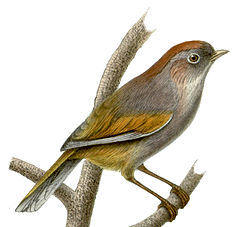| Spectacled fulvetta | |
|---|---|
 | |
| Scientific classification | |
| Kingdom: | Animalia |
| Phylum: | Chordata |
| Class: | Aves |
| Order: | Passeriformes |
| Family: | Paradoxornithidae |
| Genus: | Fulvetta |
| Species: | F. ruficapilla |
| Binomial name | |
| Fulvetta ruficapilla (Verreaux, J, 1871) | |
| Synonyms | |
Alcippe ruficapilla | |
The spectacled fulvetta (Fulvetta ruficapilla) is a bird species in the family Paradoxornithidae. Like the other typical fulvettas, it was long included in the Timaliidae genus Alcippe or in the Sylviidae.
Contents
It is found in China. Its natural habitat is temperate forests.
